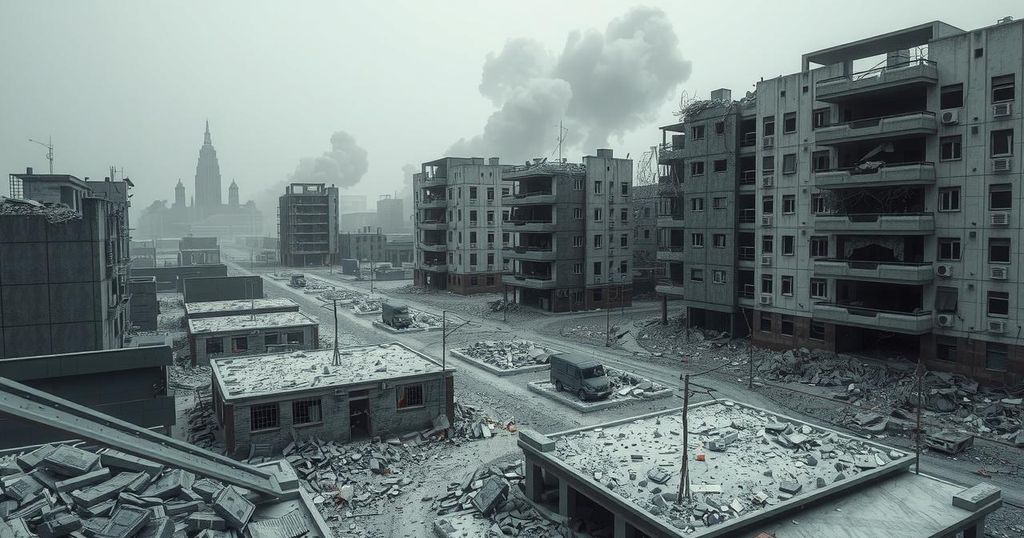Trump Proposes ‘Freedom Zone’ for Gaza Amid Rising Violence and Ceasefire Stalemate

President Trump suggested making Gaza a “freedom zone” amidst Israel’s ramped up military operations, resulting in significant Palestinian casualties. His proposal has faced widespread rejection, particularly from Arab nations. Ceasefire talks remain stalled, and humanitarian concerns deepen as the conflict continues. Trump also focused on advancing investment deals during his trip to the Gulf region, highlighting significant partnerships with countries like Qatar.
President Donald Trump recently proposed transforming the Gaza Strip into a “freedom zone” as he wrapped up his Middle East visit. This contentious proposal comes amidst Israel’s ongoing military operations, which, according to health officials, have resulted in over 150 casualties in just one day, exacerbating the ongoing humanitarian crisis.
During his comments following a roundtable discussion in Qatar, Trump emphasized, “Gaza has been a territory of death and destruction for many years,” suggesting that U.S. involvement could reshape the region. This plan is in line with the Israeli government’s objectives, which seeks to displace Palestinians permanently and repurpose the land for new developments. Notably, Arab nations have overwhelmingly expressed their opposition to this initiative, with Hamas categorizing it as a form of ethnic cleansing.
As Trump made these assertions, the death toll for Palestinians as a result of Israeli strikes surpassed 53,000, including a grievous number of children, highlighting the severity of the situation. Hospitals in Gaza have reported that the recent wave of airstrikes has returned with a vengeance, leading to hundreds of fatalities this week alone. The destruction has been staggering, with Trump remarking, “There is practically no building standing. It’s not like you’re trying to save something.”
Just prior to Trump’s arrival, Hamas had released U.S.-Israeli hostage Edan Alexander, raising a flicker of hope for potential ceasefire negotiations. Unfortunately, stalled talks have not yielded any significant developments, even with the presence of Israeli negotiators in Qatar. Hamas negotiated the release with U.S. intermediary support, bypassing Israeli Prime Minister Benjamin Netanyahu, who is facing mounting domestic pressure.
Netanyahu has insisted on a temporary truce only, stating that any pause would lead back to military operations aimed at eradicating Hamas. Throughout Trump’s visit, he received input from regional leaders about the dire need to end the violence; however, Israel remains focused on expanding its military footprint in Gaza, actively conscripting reservists for potential offensives.
Amidst these discussions, Israel is promoting a U.S.-backed initiative to distribute food rations in southern Gaza for forcibly displaced Palestinians. Critics, including humanitarian organizations, have expressed that this would put civilians at an elevated risk and worsen their conditions. As it stands, Israel has maintained a blockade for over two months, effectively restricting aid, which has pushed many residents closer to famine.
Trump’s agenda during the Gulf visit revolved primarily around significant investments in U.S. companies, particularly involving defense contracts. Qatar recently signed an order that could amount to a deal for up to 210 Boeing aircraft. Meanwhile, Trump addressed U.S. troops at Al-Udeid Air Base, offering a familiar rallying cry while inaccurately claiming his 2020 election victory.
While asserting the military’s prowess, he criticized political correctness within the armed forces, stating, “We don’t care if you’re politically correct.”
As Trump prepares to conclude his tour in the Gulf, the international community continues to watch closely as violence escalates in Gaza and hopes for peace dim amid ongoing hostilities.
In summary, President Trump’s proposal for a “freedom zone” in Gaza has garnered significant backlash, occurring against a backdrop of escalating violence and heavy casualties among Palestinians. His seemingly opportunistic focus amid ongoing ceasefire negotiations highlights the complexities of Middle East politics and the region’s multifaceted humanitarian crisis. Trump’s visit also underscores ambitions for economic partnerships while grappling with the urgent need to address the war’s impact on innocent civilians.
Original Source: www.wxxinews.org








